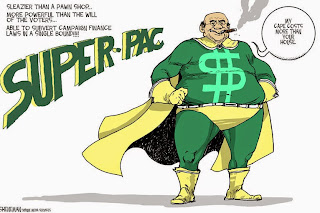You may have heard that
you are more likely to be hit on the head by a meteorite than to win the
lottery. This is certainly so.
Assuming that the game is honest, the odds are
roughly one in several hundred million. Even with these odds, lottery commissions are not
satisfied. The lottery is rigged.
The
giant multi-state and individual state lotteries are more fixed than pro
wrestling. The jackpots go up and up, with no winners.
People get lottery fever. Millions nationwide are willing to wait in a
line just like the ones for bread in the former Soviet Union for the pipe dream
of striking it rich.
The rigging
works like this: super computers keep track of each combination sold, and then
the ping-pong balls are weighted to assure that a losing combination comes up.
On rare occasions, all possible combinations are sold, and they must let someone
win. Only then is the game honest.
Why? The lottery,
which is a state-run version of the Mafia's numbers racket, is a great money
grab scam, as long as it brings in more than it pays out. In the past, lotteries
were abolished because they lost money.
The
worst part of this is whom it hurts. The poor and desperate are the most common
victims of lottery fever. Children
go hungry and senior citizens go without their medication because of it. People
prone to gambling addiction also blow huge sums.
We spoke with an
employee at a state lottery agency. We can not reveal his name or even which
state, as some of the same gangsters who ran the numbers racket now run the
lottery, and they would kill him.

“Yes,
I personally am involved in it. Lottery ping-pong balls have a small valve, like
a basketball or soccer ball, only it’s very tiny, and nearly invisible. We use
a hypodermic needle to inject heavier-than-air gasses such as radon into the
balls we don’t want to come up. At first, we tried helium in the ones we did
want to rise, but they jumped up so quickly that it was obvious. Lotteries are
raking in much more than if the games were honest, and people don’t know they
have literally no chance!”
“If
you think about it logically, you certainly don’t play anyway. You are betting
that you can predict which six of 45 or more balls are going to come out of the
hopper. In some games, the order even matters! It’s a sucker’s bet, and
that’s when it’s honest! Most drawings are rigged, making the odds zero in
infinity! The lottery is not only a tax on people who don’t understand math;
it is an unfair and unjust tax. Didn’t we have the American Revolution over
taxes like that?”
You
read it here first.
In other words - you can better throw your money in the fire than play the lottery and it is high time governments which allow or organize Lotto review these fraudulent Lotto games.
In other words - you can better throw your money in the fire than play the lottery and it is high time governments which allow or organize Lotto review these fraudulent Lotto games.
Read more: THE LOTTERY IS RIGGED





